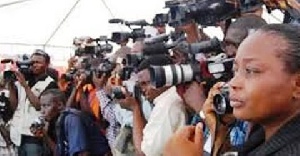 Video journalists. File photo.
Video journalists. File photo.
The lack of a broadcasting law is hampering efforts by the National Media Commission (NMC) to regulate the activities of radio stations, especially in matters of hate speech and inflammatory remarks.
Mr Kabral Blay-Amihere, former Chairman of the NMC, said the passage of the Broadcasting Bill was long overdue adding that if it had been passed there would be no need for the courts to intervene when there were infractions on the airwaves.
He said under the current system the National Communication Authority granted frequencies to the broadcast media but the regulation was left in the hands of the NMC.
Mr Amihere made these remarks in Accra during a Media Forum against Hate Speech, on the theme: “Election 2016: Issues! Not Insults”.
It was also addressed by Ms Akua Kwafoa Gyekye, the Public Policy Manager for Africa at Facebook in London, Mr Henry Omusundi Maina, the Director of Article 19 for East and the Horn of Africa, and Mr Emmanuel Mugisha, the Executive Secretary of the Rwanda Media Commission.
The forum, which was organised by the Media Foundation for West Africa, was under the auspices of the French Embassy, Star Ghana, and Opened Society Initiative for West Africa (OSIWA), came in the wake of the Montie FM panelists who are in court for contempt.
Mr Amihere said over the last decade, Ghana’s Broadcasting Bill had been in the pipeline and that there was no sign that the current Parliament would be passing it.
He said without such a law, the NMC would continue to be a toothless dog in regulating the activities of the broadcast media.
He cautioned broadcast journalists that, as they sit on the airwaves, they should be guided by the ethics of their profession and the laws of the land.
He urged the media to self regulate themselves and to desist from commenting on matters which were pending before the court so that they would not end up in court.
Ms Gyekye, however, said social media mirrored the wider society and therefore, banning it would not solve the problem.
She urged the public to report all forms of hate speeches and inflammatory remarks on facebook to her outfit for redress.
Mr Maina said hate speech was a global problem which needed to be nipped in the bud.
He said hate speech manifested itself in the form of political speeches, sensational and alarming headlines, and derogatory remarks “such as calling other people cockroaches”.
Mr Maina explained that when people were being referred to as animals, in the event of a conflict, killing them becomes so easy because they were already being referred to as animals.
He said anybody could own a media house, however, its management should be left in the hands of professionals.
Mr Mugisha recounted that the 1994 genocide erupted in his country as a result of hate speeches on the airwaves; saying within a period of 100 days over one million people had been slaughtered.
He said hate speech was very dangerous and cautioned Ghanaians to avoid it, especially on the airwaves.
Mr Sulemana Braimah, the Executive Director, Media Foundation for West Africa, said despite the fact that Ghana had a free and pluralistic media, the media must guide against hate speech.
He said Ghanaians must guide against travelling the terrible path of hate speech which led to conflicts in countries like Kenya and Rwanda.